Lent
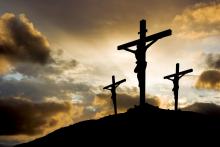
Abram left his homeland on a promise and a prayer. God called. Abram went. The Biblical text makes it seem so simple. There are no signs of struggle or doubt. There is no grief over what is left behind, only the forward look toward a new land and a new future. Leaving home for Abram seems so easy.
As I reflect on this week’s scripture, I’m in Lebanon listening to stories of Syrian refugees who left their countryand their kindred to find a place of refuge. Unlike Abram, they did not leave on the promise that they would become a great nation. They left because bombs fell on their houses. They left because food became scarce. They left because they watched their loved ones die in the rubble as buildings fell to the ground.
As we enter into this season of Lent, it is fitting for us to pause and listen to their stories. Remembering Christ’s suffering is more than an exercise in gratitude. It is a chance for us to stand in solidarity with those around the world who suffer each day. It is a challenge for us to take our own suffering (be it large or small) and connect it to the suffering of others and to the suffering of Christ on the cross.

For most folks, these names will not mean much: Eric Pizer, Christopher Barber, and Andrew Harris.
They are names that may have a bit resonance in Wisconsin, where I am from. What they represent, though, are the struggles we face as a society dealing with concepts of repentance and redemption. They represent the way those concepts get overrun by politicians seeking to exploit the public’s fears. We as a people, after all, do not seem to be in a very forgiving mood these days.
So the distinctive stories of these three Wisconsin residents might offer a good starting point for Christians thinking about what our faith tradition calls us to during this season of Lent.

“Jesus was led by the Spirit into the wilderness to be tempted by the devil.”
Thus begins the spiritual drama of Lent, the forty days before Easter that commemorates Jesus’ wilderness experience. No human, not even Jesus, can escape the temptation of the devil.
Just before Jesus was led into the wilderness, he was baptized in the Jordan River by John. As the Gospel of Matthew reports, when Jesus emerged from the water “a voice from heaven said, ‘This is my Son, my Beloved, with whom I am well pleased.’”
Jesus’ identity as God’s Son had always been true, but he received confirmation of his relationship with God at his baptism.
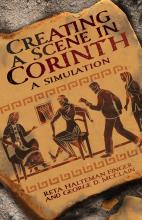
ONE YEAR MY small group decided to have each member choose a person named or alluded to in the gospels to “follow” during Lent. We researched our people and the customs of that time and reflected individually and collectively on their encounters with Jesus. Then we hosted a community meal for family and friends on the night before Easter. Each member of our group came in character as the person we’d studied and tried to recreate the mood of that frightening, confusing, grief-filled night for followers of Jesus after his death and before his resurrection. After the meal, each of us presented a monologue that tried to project what our person might have been thinking and experiencing at that time.
The attempt to immerse mind, soul, and body into scriptures that I had listened to for much of my life (but perhaps hadn’t really heard) was a transformative experience: It burned away long-held assumptions and revealed new facets of chapter and verse.
The book Creating a Scene in Corinth: A Simulation, by Sojourners contributing editor Reta Halteman Finger and George D. McClain, provides a useful and fun toolbox for small groups, Sunday schools, religion classes, and even imaginative individuals who want their own full-immersion experience of scripture and biblical scholarship. It invites readers to a deeper understanding of the apostle Paul’s letter to the church in Corinth by using role play to “become” members of the different factions of that community as they hear Paul’s words read for the first time. The authors assert that “as we more clearly experience what Paul meant in the first century, we can better understand what his writings mean in our 21st century context.”

Seven years ago this week, I had my “come to Jesus” moment.
That’s not to say that over the past few years I haven’t had many experiences in which I’ve come away wondering “did I ever really believe up until now?” Many of those moments were far more profound and life-changing. It’s just that for me, it’s where a certain chapter of my life began.
I was raised in a Christian tradition that prized altar calls and bowing your heads, closing your eyes, and raising your hands to be saved. There was a clear delineator of when you were “born again” and when you were not. It was a moment in history, not just a spiritual exercise.
I don’t totally disagree. I think that there is something significant about the moment you first say yes, the same way I can remember the first time my best friend and I stopped just being colleagues. Our friendship has had many more important moments, but going to see Alice in Wonderland after work on a rainy Monday evening in March was where it started.
But as I have persisted (persevered for you Calvinists) in this faith I’ve discovered more and more what a relationship with God is like. In order for it to work, as Martin Luther famously said, all of life must be repentance. Every day the choice to say “yes” and not “no, I’m so done with this” is just as significant, if not more because coming to Jesus is often easier than staying.

Even the winter won’t last forever. We’ll see the morning, we’ll feel the sun.
We’ll wake up in April, ready and able, Sowing the seeds in the soil.
Even the darkness cannot disarm us. We’ll see the morning, we’ll feel the sun.
-Audrey Assad
Easter is what many would argue to be the quintessential turning point of the Christian faith. The crux. The climax of the story. The thing that you must be able to articulate into carefully formed sentences depicting your belief, as though words and theology solely define your spirituality and very existence. Perhaps from all of this lies the basis for the trite messages that I, along with so many others, have heard about the Christian faith. “Jesus died for your sins.” “Jesus paid the debt.” “Jesus stood in your place and died for you so that you might have life.”
And if those words bear truth and meaning to you, I have not come to take them away, nor discredit them.
It’s just not the Jesus I’ve come to know, face-to-face in my human spiritual struggle.
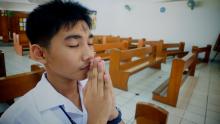
Today is Ash Wednesday and the beginning of Lent. I grew up in a small evangelical church that only paid attention to the Christian calendar on Christmas and Easter. But over many years now, I have learned to celebrate the richness of all the Christian seasons from my friends in more liturgical traditions and from marrying a Church of England priest!
Lent offers us the much-needed spiritual preparation for Easter. Ash Wednesday is the place to begin; and that often includes fasting — in different ways and traditions. At Sojourners, we usually have a big staff pancake breakfast on Shrove Tuesday morning, the day before Ash Wednesday. But today, many of us are fasting.
Ash Wednesday doesn’t begin a hunger strike, but rather a season of self-examination, spiritual reflection, repentance, sacrifice, and focused prayer. Lent is a time to examine our hearts and lives, to acknowledge our sins, to look for the ways we are not choosing the gospel or welcoming those whom Jesus calls us to.
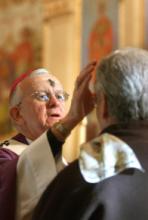
This Wednesday marks the beginning of Lent with Ash Wednesday. For Christians, Lent is a 40-day season of fasting, reflection, and penance culminating in Holy Week and the Easter Sunday commemoration of Jesus’ Resurrection.
The Rev. Arne Panula, director of the Catholic Information Center in Washington, D.C., said his experience is that more people go to church on Ash Wednesday than any other holiday, including Christmas and Easter.
Here are a few basics on the Ash Wednesday tradition.
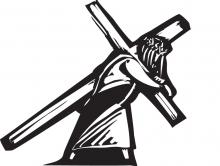
There are so many people that have gone before me, people that have sacrificed their lives in pursuit of justice and equality. Because of this, I feel a deep sense of commitment to honor them by standing for some of the same things that they did. I am in complete awe of two things that connect deeply for me. The first is the cross and how Jesus gave his life for us all. The second is my ancestors who somehow understood Jesus’ sacrifice and passed it onto me through intense persecution.
I can’t say that I know persecution like my parents, grandparents, and great-grandparents knew. I have been back to southern Alabama many times for family reunions and visited slave graveyards where relatives are buried. This compels me to be and do more with my life. I can’t say I understand why Jesus would choose to become human, walk this earth as a human being, and then die at the hands of his own creations to save those who were crucifying him. However, I do know it pushes me to be and do more with my life. I feel like I would let them down somehow if I didn’t take responsibility for addressing injustice with my life.
My life is not my own. I am the product of sacrifice. I am here because of those who saw beyond themselves and thought personal sacrifice was worth giving up to allow justice to take hold. I am here because Jesus modeled something completely illogical on the cross and then some of my ancestors took that example seriously and repeated it. I have no real right to the life I live. My only recourse is to continue the tradition handed to me in the same way.

I stepped off the elevator and was greeted by three men with hoodies in church yesterday. My shoulders tensed for a few moments. Growing up in New York City, I’ve been groomed in paranoia and 20/20 peripheral eyesight. Yet after taking a second look, I smiled as I admired the theater props: Three hooded figures containing the faces of Hillary Clinton, Jay Z, and Trayvon Martin, with a caption reading, “We are Trayvon Martin.”
Metro Hope Church meets weekly at Harlem’s National Black Theater, so our church gatherings can often be a dance in improvisation as we’re frequently welcomed by new sets. One summer we were greeted by a gigantic “tree” protruding from center stage. It made this preacher’s imagination run vivid with all sorts of sermon possibilities.
But the hooded figures that greeted me last Sunday were a tribute to Trayvon Martin called, Facing our Truth: 10 Minute Plays on Race and Privilege. This month also happens to be the month that Trayvon Martin was born, and a month for celebration of Black History. These convergences do not escape me, nor does the distinct mission of our church in Harlem.
No stranger to dialogue on race and privilege, our church will often reflect on Dr. King who once lamented, “We must face the fact that in America, the church is still the most segregated major institution in America … 11:00 on Sunday morning …we stand at the most segregated hour in this nation.”

With the exception of “WWJD” bracelets, there are few times when outward physical appearance reveals Jesus followers in the public square. Other religions often require their faithful to move through the mundane activities of life outwardly proclaiming the core of their faith. For the traditional Hindi it is the saree or the sherwani. For the Muslim it may be the kurta or hijab; for the traditional Jew the yamaka or headscarf. Every day around the world these men and women move through life, often in cultures unlike their own — marked.
Once a year the global body of Christ reveals itself to the world en masse. Foreheads marked with ashes, the global church moves through the first day of Lent with the sign of the cross in plain view for all to see. In the midst of the mundane, those ashes blend with sweat and soot and reveal to the world just who is a follower of Jesus in their midst.
It is a profound feeling to move through the streets of Washington, D.C., New York, Los Angeles, Cincinnati, or Huntsville, Ala., with your deepest beliefs marked on your forehead.
The Lenten mark of the cross, in tangible form, brings the church into solidarity with Jesus’ 40-day struggle in the wilderness — the place of desolation, the place of waiting and wandering, temptation, and confrontation with the limitations of our human-ness.

INVITATIONS COME. Yet an expressed desire for your presence does not guarantee your willingness to show up. Invitations require a response. Some responses indicate significant commitment beyond “just showing up.” A summons may first entail an RSVP indicating a commitment to actually take an active part in the opportunity.
Such is the case for the people of God. Invitations arrived inviting God’s people to be witnesses to the power and presence of a particular God and to become a people who practice justice and favor kindness—peculiar expectations for an ancient culture, for any culture. A requirement of this sort unsettles the status quo of cultural mores where religion represents polytheistic attributions to a type of celestial Santa Claus or divine ATM, or where religion has been privatized—set aside from public prophetic witness to meditative reflection in the privacy of our own homes with occasional festive gatherings. Such genie-worship and privatization results in a deafening silence among the people of God. As Pope Francis put it recently, “a privatized lifestyle can lead Christians to take refuge in some false forms of spirituality.”
The promises that God calls us to are promises that Michael Frost, in Exiles, calls dangerous. They accompany dangerous memories that make a dangerous critique of society.
Over the next five weeks, the invitations extended in these texts indicate more than increasing the head count of seekers of spirituality. They require a response that signifies a commitment to participating in a community whose primary purpose is to expose the dangerous promise of God.
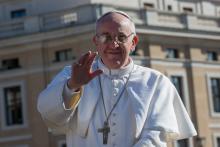
The Vatican on Friday dismissed criticism of Pope Francis’ decision to wash the feet of two women during a Maundy Thursday Mass at a Rome youth prison.
The move has come under fire from Catholic traditionalists who say that the rite is a re-enactment of Jesus washing the feet of the 12 apostles before his death, and thus should be limited only to men.
Traditionally, popes have washed the feet of 12 priests during a solemn Mass in Rome’s St. John Lateran Basilica.

The night was cold and dark as the family approached the border. Ahead of them were miles of desert that would test their will and drain their stamina. What they were doing defied the law. But they were a family, and families will do anything for the sake of their children.
The law they defied was that of Herod. The family: Joseph, Mary and the Christ-child.
As Christians prepare to celebrate Easter, let us remember that the life that ended on the cross began on the road. This Easter, let us remember that Christ the Savior began his life as an immigrant, fleeing the land where he was born to escape Herod’s wrath.
Easter is a holiday of new beginnings. It welcomes a new season. It is a time to start fresh. At the heart of Easter is a magnificent reservoir of grace. Of this holiday, Katherine Lee Bates reflected, “It is the hour to rend thy chains, the blossom time of souls.” Easter is a time to set people free, fix things that are broken, watch souls blossom — all for glory of the risen Christ.
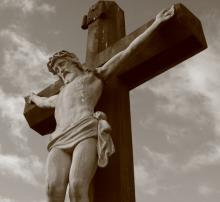
The first Christians confessed that Jesus is "God from God, light from light, true God from true God." Jesus is, they finally confessed after centuries of dispute, who the Gospels and the apostles plainly tell us: God without qualification. Bethlehem's baby boy grew to be the man from Nazareth, who is also from before time and forever the only begotten Son.
Jesus tells Philip that he and the Father are one; that if Philip has seen Jesus, then Philip has seen the Father. Paul tells the Colossians that Christ is the visible image of the unseen God. The Hebrews are taught by their apostle that Jesus bears the very stamp of God's nature.
If anything we think we knew about God before Jesus arrives in Mary's womb contradicts what we see and hear of Jesus in the Gospels, then we are the ones who are mistaken, the ones who weren't paying close enough attention before he came (yes, Jesus reveals the same relationship-initiating God of holy love we encounter in the pages of the Hebrew Bible); we are the ones who have, since his decades of extravagant humility among us as one of us, forgotten the Christ.

For the sake of the world, we should all be feminists. And given what we know about the role of independent, empowered women in the community of disciples, for the sake world, we might be “Christians.”
Raymond Brown, the late, great scholar of John, writes: “In this Gospel, where light and darkness play such a role, darkness lasts until someone believes in the risen Jesus.”
Therefore no darkness, no heartbreak, no grief, no injustice can long stand where the Risen Christ is proclaimed. Jesus Christ is the light of the world. The light shines in the darknessa and the darkness does not — cannot — will not overcome the light.

We are offered a significant choice, namely between two ways of being human. The difference between logical necessities or physical necessities and vital necessities is made clear in that in the latter we have the possibility of refusing ‘to turn away from a disaster’ – we can in fact choose a lesser way of being human over a fuller way. What is at stake in the necessity of cry is one’s own humanity, the meaning of one’s own existence, and to turn away from crying is to turn away from decision and responsibility. This is to deny the very possibility of becoming genuinely human.
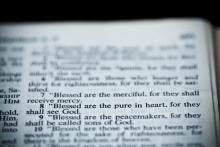
“Blessed are the peacemakers, for they will be called children of God.
“Blessed are those who are persecuted for righteousness’ sake, for theirs is the kingdom of heaven.
“Blessed are you when people revile you and persecute you and utter all kinds of evil against you falsely on my account. Rejoice and be glad, for your reward is great in heaven, for in the same way they persecuted the prophets who were before you.”
Social Justice Reflection:
Jesus was a peacemaking, blessed child of God, but he also was an “other.” Reviled and persecuted, he was the paperless son of displaced immigrant parents. The prophetic iconoclast. That guy who hung out with those people, the type most modern leaders would not associate with, except for a photo opportunity at a Thanksgiving Day soup kitchen. Let us remember on Sunday when we celebrate his resurrection, that Jesus was crucified because he was an outsider whose way of doing things scared and angered the powers-that-be.
We have become a nation that loves to “other” people. We point out their differences as reasons they cannot be trusted, as evidence that they take too much from the rest of us or threaten our well-being. We have lengthy, bitter debates about allegiance and legitimacy, and we reject those who do not meet our standards. We know who belongs, and the others need to clear out and leave us alone with our worldly possessions, our rules, and our way of doing things.

We're anticipating.
We're jubilant!
“Hosanna in the highest! Blessed is he who comes in the name of the Lord!”
So, we dance and we sing.
But just before this moment in the story there's this surprising passage. The Gospel of Luke reads, "As they were listening to this, he went to tell a parable, because he was near Jerusalem, and because they assumed that the kingdom of God was to appear immediately."
"Immediately." Well, at least they knew their own minds. This is the trouble about knowing our own minds. It's not the same thing as having a thesis with a well constructed argument. And it's not the same thing as being right.

As a seminary graduate and a Masters of Social Work student, I have a passion for social justice and working to improve the wellbeing and health of vulnerable populations. After seminary, during my time as a youth leader, we often turned to Matthew 25:31-46, the familiar passage about “the least of these,” and discussed God’s emphasis on justice and serving the marginalized in our societies.
My time as a social work student, particularly through my current class on international social work, has expanded my concept of the “least of these.” We have learned about some of the most vulnerable populations around the world – child soldiers in Uganda and Colombia, young girls trafficked into the sex trade in Cambodia, HIV/AIDS patients from Haiti, migrants left to die in the desert while trying to cross the Mexican-U.S. border, and the list continues. These concepts were not completely unknown to me and would likely not be new to you either. This past week, however, we studied a different topic, one that has not drawn as much media attention – global mental health.